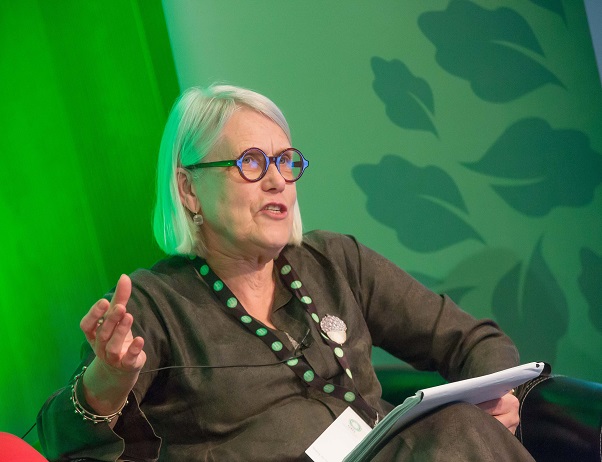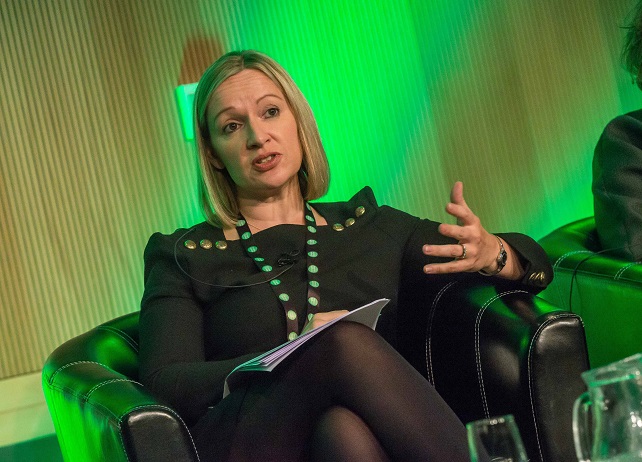
Senior members of the Irish agri-food industry today were urged not to be complacent when it comes to meeting the ongoing challenges for the sector and to consider the development of a ‘National Food Strategy’. The message was delivered to more than 150 delegates at the ‘Shaping the Vision for Ireland’s Agri-Food Industry 2030’conference in the Convention Centre, Dublin. The event was organised by Ceres, new women in agri-business network, which aims to develop and promote leadership and diverse thinking within the industry.
The conference was opened by Fiona Muldoon, CEO, FBD Insurance who said that the sector is packed with ‘professional, able, smart individuals’ who need to rise to the challenges the industry is currently facing.
“Political and currency risks have increased immeasurably over the last 12 – 18 months. These fluctuations have already taken casualties and have placed pressure on all of the agri-food sectors. These challenges require honest and frank debate with all industry stakeholders and policymakers. In planning our roadmap to 2030, the challenge is that we must differentiate in a highly competitive and somewhat commoditised marketplace. We can do this by offering quality, value for money and sustainability as the basis of our global product offering and thus lay the foundations for our future growth,” she said.
The event featured contributions from leading figures from right across Ireland’s agri-food sector offering their perspectives on what the industry needs to do to remain competitive and relevant over the next decade.
In a panel discussion highlighting the agri-food industry’s obligation to continue to produce safe and nutritious food, Pamela Byrne, CEO of the Food Safety Authority of Ireland (FSAI), called for the development of a ‘National Food Strategy’ with clearly defined roles and responsibilities as a matter of urgency.
“To ensure Ireland has a healthy society to support a growing economy, we need to have a coherent and integrated food strategy in place which promotes the widespread availability of safe, nutritious, and trustworthy food. To achieve this, Irish society and businesses need to work together to ensure that our culture of producing food is based on safety, integrity, authenticity and the provision of high-quality nutrition. The Food Safety Authority of Ireland is committed to leading the development of this culture through promoting partnerships and delivering the necessary innovations and insights”, she said.
In the same panel, Darina Allen outlined her vision for Ireland as an organic food island and stressed the need to prepare farmers in a post-glyphosphate era who have ‘forgotten how to farm without chemicals’. In response, Michael Hoey, MD of Country Crest said that a completely organic industry was ‘not practical’ but stressed that the industry could aspire to produce the cleanest, most efficient, most sustainable food in the world.

Contributing to a panel discussion on global trade, Brexit consultant, Lucinda Creighton of Vulcan Consulting warned attendees to be prepared for all possible outcomes from the ongoing Brexit negotiations.
‘’Ireland’s agri-food businesses need to prepare and act now. Ignore the sound-bites and assume the worst to put yourself in the best position to survive. With the British government devoid of any rational thinking or coherent planning, the onus is on the Irish agri-food industry, along with the Irish Government, to make up for that and start planning ahead for every eventuality, including a “no deal” scenario,’ she said.

The conference, which was sponsored by FBD Insurance, also featured contributions from Doreen Corridan, Veterinary Consultant, Munster AI; Ann Derwin, Director of Global Irish Division, DFAT; Pat O’Keeffe, Head of Farmer Relations, Glanbia; Sinead McPhillips, Head of Agri Food Policy and Strategy Development, DAFM; and Helen King, Director of Consumer Insights, Bord Bia.
The speaker sessions were followed by a lively “open space technology” networking session in which delegates were encouraged to proactively engage with others in the room on common themes or issues with the aim of having meaningful conversations and finding pathways forward in resolving some of the most pressing issues currently facing the industry.
Concluding the session, Monica Gorman, one of the founding members of the Ceres Network said, “Agriculture in Ireland and globally is facing many challenges and within those challenges are opportunities and risks. We were challenged this morning to be proactive and take responsibility for finding solutions. One thing we know is that no one person or organisation has all the answers and that realistically there are no easy solutions – or none that come without a cost. With this conference we wanted to create a space for diverse voices and people to discuss in an open way some of the challenges and opportunities and we would encourage people to now take responsibility for finding the answers to your questions and actively seek these kinds of spaces to create new energies, new chemistries, and innovative thinking.”



